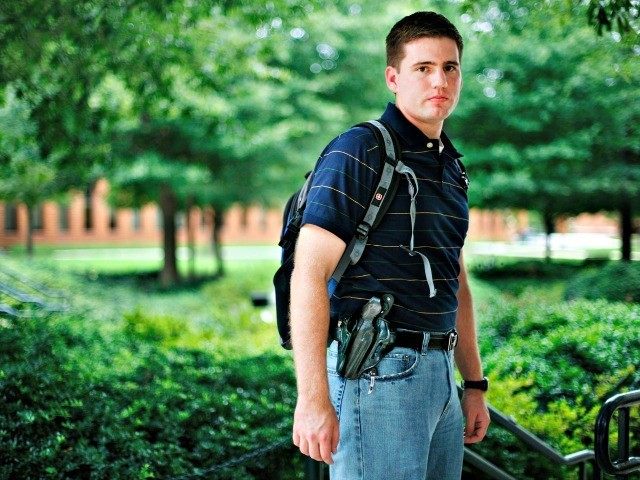Eight states in the U.S. protect the right of students and/or faculty with concealed carry permits to carry guns on college and university campuses for self-defense.
Some of the eight arrived at campus carry via legislation, while others arrived via court decisions:
Colorado: Campus carry became a fixture in Colorado in 2003, with the passage of the Colorado Concealed Carry Act. The act was later bolstered by a Colorado Supreme Court ruling, which forced the University of Colorado to comply with the concealed carry law. During the tenure of campus carry, Colorado has witnessed no shootings or crime sprees on campus by concealed carry permit holders, although gun controllers regularly warn both will happen if campus carry is allowed. One incident occurred in which a Colorado University employee accidentally discharged a gun. No one was injured, and the employee was terminated.
Utah: Campus carry legislation was adopted in Utah in 2004. According to IdahoReporter.com, in 2014–after ten years of campus carry in Utah–the incidents tied to campus carry had amounted to a gun falling out of a backpack at Dixie State College and scattered incidents of students being reported for having a gun after telling friends they were carrying. Much like Colorado, Utah is a solid example against leftist arguments that campus carry laws “make learning environments less safe.”
Idaho: Governor “Butch” Otter (R) signed legislation legalizing campus carry on March 12, 2014. The bill made campus carry for concealed carry permit holders the law of the land on colleges and universities in the state, but the law does require that those planning to carry acquire an “enhanced” carry permit before doing so.
Mississippi: Like Idaho, Mississippi recognizes campus carry for concealed carry permit holders with an “enhanced” permit. Mississippi added the “enhanced” permit in 2011, and in 2013, state Attorney General Jim Hood released an “Opinion to Clarify Gun Carry,” which explained that persons with “enhanced” permits can carry in places where regular permit holders are barred–including college and university campuses–with some exceptions.
Wisconsin: Campus carry became legal in Wisconsin when Governor Scott Walker (R) signed concealed carry into law in 2011. A concealed carry “Question and Answers” sheet, published by the Wisconsin Department of Justice, explains that certain buildings on campuses may lawfully be labeled off-limits, and concealed carry and permit holders must comply.
Oregon: Campus carry was recognized as lawful in Oregon via an 2011 Appeals Court ruling on behalf of a Marine Corps veteran who was a student at Western Oregon University. According to the International Business Times (IBT), the court ruled that state law “let permit holders carry on public college grounds.” Colleges and universities have since worked to limit areas in which concealed permit holders can carry for self-defense, but Oregon Live reports that the various policies have been focused on barring campus carry in certain buildings, venues, and events, not against concealed permit holders shaving a gun on public campuses in general. It should be noted that Umpqua Community College (UCC)–the sight of the heinous October 1 attack–has its own governing board and was, therefore, able to opt out of campus carry, which it did. IBT reports that firearms for self-defense were prohibited on the UCC campus as part of standard policy on the day the shooting occurred.
Texas: Campus carry for the Lone Star State was signed into law by Governor Greg Abbott (R) on June 13, 2015, and takes effect in August 2016. It allows students with concealed handgun licenses to carry guns for self-defense on public college and university campuses. And while those public colleges and universities cannot ban campus carry altogether, KXAN reports the law does allow them to “carve out gun free zones” on their campuses. So concealed permit holders should familiarize themselves with the rules put in place by their particular institute of higher learning before carrying.
Kansas: Campus carry was signed into law by Governor Sam Brownback (R) in April 2013. The law takes effect on July 1, 2017. The four years between passage and implementation is because the law allows colleges and universities to bar campus carry in buildings where they have “‘adequate security measures’ such as metal detectors or trained guards.” The Lawrence Journal-World reports that the law provided universities with a four year exemption to get “adequate security” into place for any building in which they plan to prohibit campus carry.
The eight schools that mandate campus carry as a matter of state law are in addition to 23 states that place the decision to allow or ban campus carry in the hands of each individual college or university. The National Conference of State Legislatures lists those 23 as “Alabama, Alaska, Arizona, Arkansas, Connecticut, Delaware, Hawaii, Indiana, Iowa, Kentucky, Maine, Maryland, Minnesota, Montana, New Hampshire, Oklahoma, Pennsylvania, Rhode Island, South Dakota, Vermont, Virginia, Washington and West Virginia.”
Follow AWR Hawkins on Twitter: @AWRHawkins. Reach him directly at awrhawkins@breitbart.com.

COMMENTS
Please let us know if you're having issues with commenting.